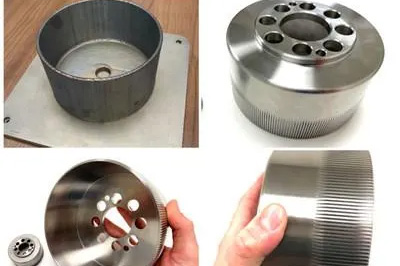
Amorphology Inc., a NASA spinoff company founded from technology developed at the Jet Propulsion Laboratory (JPL) and the California Institute of Technology, has partnered with Additive Technologies (AddiTec), a founding partner of Meltio which is an additive manufacturing company pioneering the development of affordable metal 3D printing systems. Together, Amorphology & AddiTec are developing the additive manufacturing of large steel strain wave gear flexsplines.

Strain wave gears are a compact and zero backlash gearbox used in robotic arms and precision-motion mechanisms. They transmit torque through a geared thin-walled cup, hat, or band, called a flexspline. The flexspline has precise gear teeth and a flexible wall, a combination of qualities that drives the manufacturing costs of a strain wave gearbox. Because of their complexity, strain wave gears can account for a substantial portion of the cost of a six-degree-of-freedom (6DOF) robotic arm.
“When you look at machining of flexsplines that are 6 to 8 inches in diameter, the large steel feedstock may be reduced to as little as 10% of its original volume. This is a detriment from both cost and sustainability standpoints, as energy and material are wasted to produce a part which is a shell of the original stock. Additive manufacturing becomes a promising alternative since the machining costs can potentially be dramatically reduced while allowing for the cost-effective use of high-performance steels,” said Dr. Glenn Garrett, Amorphology CTO.
Amorphology & AddiTec together have demonstrated a 6-inch diameter prototype of a strain wave gear flexspline printed in high-performance 17-4 precipitation hardened steel. The prototype was fabricated on a Haas CNC hybrid system running the Meltio Engine. The printed part was removed from the build-tray and then CNC machined into the precision shape. The process also allows for flexible and on-time production of a variety of large flexsplines without having to keep many diameters of stock in house.
